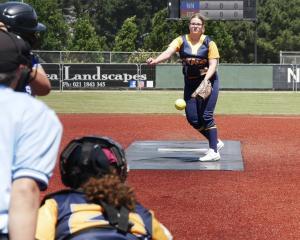
Fresh off the plane from Rio de Janeiro, Bates, the high performance para-athlete manager of the New Zealand team at the Paralympics, said it was a long road to success for the athletes in South America.
Funding cuts and a lack of athletes left the team struggling after the 2012 Games in London. Of the three athletes who competed at those Games, only Holly Robinson returned, leaving the team to rebuild from the bottom.
That posed a challenge for Bates, of Dunedin. She was part of a group that helped turn things around, starting quite literally by going out and finding athletes.
''It was finding athletes, getting them nationally classified, then internationally classified, putting some coaches around them, support networks around them and just making them high-performance athletes,'' Bates, who coached four of the Dunedin-based athletes, said.
She said a much work now went into identifying athletes. Systems at the school level had been designed to bring them through development programmes and put coaching around them.
That work enabled gems such as Dunedin gold medallist Anna Grimaldi to be uncovered.
Meanwhile, the lack of funding was something they were able to use in their favour.
''I think it taught us to be innovative, to share resources and to share a lot of knowledge,'' Bates said.
''In the long run, while it's not sustainable, it has enabled us to develop a programme that has made the athletes a lot more adaptive and resilient.
''I think there's something to be said about not having everything, not having all the resources.
''We do pretty damn good, but compared to a lot of other countries we are a long way behind. But I think that is a key component of our successes too. It makes you innovative, it toughens you up.''
Plenty of work went into the preparations, ensuring the athletes were ready to go on day.
''We started planning for this [Rio] two years ago,'' Bates said.
''Everything we did last year at our world champs at Doha was our practice for Rio, including the way we flew, where we went for pre-camp, the length of time, everything.
''It worked there, so we transferred that into Rio. There was nothing really new for those athletes.
''But they're used to making sure they train hard and that's not just on the track or on the field. It's in the gym, it's in the recovery, making sure they keep their nutrition, their hydration, their medical up to date.
''It's a big picture and lots of detail goes into making sure that whole picture is complete, allowing them to compete on the day.''
The team trained on the Gold Coast and in San Diego, before arriving in Rio five days prior to the Games.
Despite having had doubts surrounding Rio as a host city after a visit earlier in the year, Bates complimented the facilities, transport, food, village and people.
The team had signs from New Zealanders on the walls of their room in Rio, which helped set the spirit and motivation. Bates thought the coverage the team had received helped people get behind the Games and begin to identify with the athletes and their successes.
''To come home to the welcome we had at Dunedin Airport, it was pretty special,'' she said.
''There was a lot of family and friends there, but there was a lot of people we didn't really know either.''
She said changes in Paralympic sport had helped boost its profile.
''The standard of Paralympic sport has risen so much in the last eight years, it is truly high performance.
''You've got para-athletes who are competitive with able-bodied athletes.
''The one thing I've taken from it in the last eight years is that the athletes are becoming a lot more specialised. It's no longer about participation, it's very much about specialisation, which is typical in high performance sport.
''Governments are investing a lot of money now and the big thing is the coaching. The top abled-bodied coaches are coaching para-athletes now, and the integration of squad - abled and para - no segregation whatsoever.
''So it's had a huge impact on the standard internationally and I think that's why our athletes in New Zealand have succeeded as well.''











